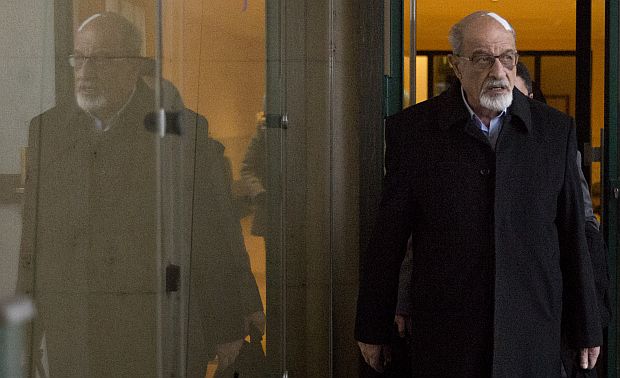
Haitham Al-Maleh, a senior member of the Syrian National Coalition, leaves a meeting with UN mediator Lakhdar Brahimi at the United Nations headquarters in Geneva, Switzerland, on Sunday, January 26, 2014. (AP Photo/Anja Niedringhaus)
Cairo, Asharq Al-Awsat—With speculation mounting over a prospective third round of Geneva II peace talks between the Assad government and the Syrian National Coalition, opposition delegation member Haitham Al-Maleh described the talks as being “absurd, pointless and fruitless.”
In comments to Asharq Al-Awsat, Maleh portrayed the Western-backed peace talks as being unlikely to reach a solution to the ongoing Syrian conflict, dismissing the Assad government delegation as being virtually powerless and Russian and American mediation efforts as being unconcerned with the tragic situation on the ground in Syria.
He said: “The Syrian government delegation lacked any real powers in the sense that it had to consult with Damascus on a moment-by-moment basis.”
The long-awaited Geneva II peace talks began on January 22, 2014, but failed to reach any real agreement, with even UN envoy Lakhdar Brahimi acknowledging that “we are not making much progress in this process.”
Speaking on February 14, following the second round of Geneva II peace talks, Brahimi said: ““We’re still looking for the point where we can see the light at the end of the tunnel.”
According to Maleh, the two delegations sat on opposing sides of a square table but rarely directly addressed or even looked at the other side, instead addressing everything to international envoy Lakhdar Brahimi.
Maleh confirmed that Syrian permanent representative to the UN Bashar Al-Jaafari took over leadership of the Assad delegation after Syrian Foreign Minister Walid Al-Mouallem walked out, but criticized Jaafari’s performance.
“The session started with a speech by Jaafari, who despite being educated and possessing a fine command of the Arabic language, does not have a political vision,” he said.
Maleh revealed that Jaafari pursued an intransigent approach throughout the negotiations. Asked whether the two sides had any direct interaction during the peace talks, Maleh said: “We did not shake hands or exchange eye contact, since they consider the opposition to be foreign collaborators.”
Maleh said the government delegation insisted they could not approve anything before consulting with Damascus, despite the fact that Mouallem, Deputy Foreign Minister Faisal Mekdad and presidential adviser Bouthaina Shaaban were all close by.
“I do not rule out the possibility of Mouallem’s office being equipped with some technology to enable him to listen to what was going on inside the negotiating room,” he said.
Maleh said that there were two main problems facing the negotiations: the government delegation’s initial rejection of Brahimi’s agenda, and the UN envoy inserting the issue of terrorism into the talks, which sidelined any progress.
“We do not have anything against renouncing terrorism, but the government delegation considered the issue of terrorism as the main focus of the negotiations,” Maleh said.
He added that he was not surprised that the “talks ended in failure,” adding that he had expected this from the outset.
“The talks have been pointless so far, and will not lead to any results unless the government puts the Geneva I communiqué into effect which stipulates the establishment of ceasefire, the release of prisoners, and the withdrawal of military vehicles and heavy weaponry from the cities and villages of Syria.”
Despite its failure, Maleh said a third round of peace talks is still possible. “I expect a third round of talks in Geneva, as Brahimi is facing pressures to continue the talks.”
“Moscow and Washington will continue pressuring Brahimi for talks to continue. In fact, neither of them is concerned about the situation in Syria, and I accuse Russia of responsibility for the death of Syrians after it pumped weapons and money to the Syrian regime.”
Speaking on the subject of terrorist activity in Syria, Maleh said: “The opposition has been affected by terrorism, and the Free Syrian Army is fighting the Islamic State of Iraq and Syria and 25 other factions that are fighting directly alongside the regime.”
According to Maleh, “ISIS is fighting alongside the regime and Al-Qaeda is no longer made up of Zawahiri’s and Bin Laden’s groups only; rather, it has been infiltrated by the Syrian regime.”
